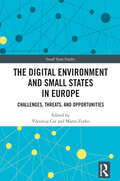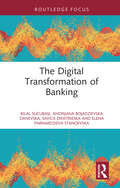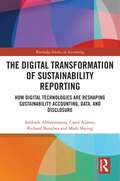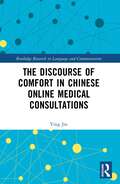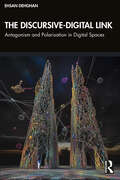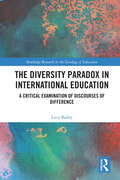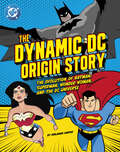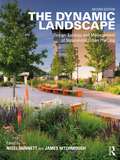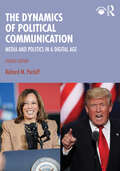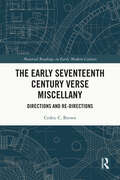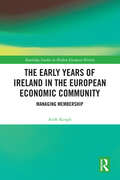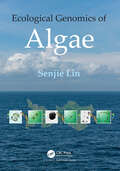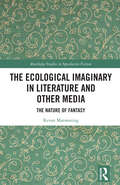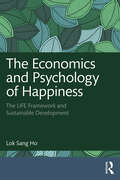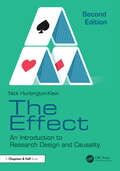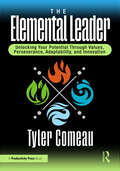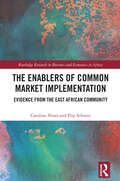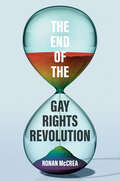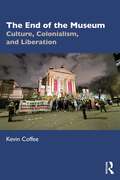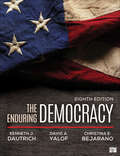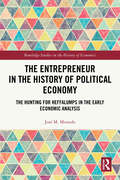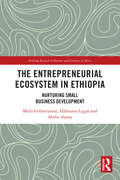- Table View
- List View
The Digital Environment and Small States in Europe: Challenges, Threats, and Opportunities (Small State Studies)
by Viktorija Car Marta ZorkoThe Digital Environment and Small States in Europe delves into how the digital revolution intersects with global security dynamics and reshapes the geopolitical landscape. It sheds light on the geopolitical complexities inherent in the border regions of the European continent and proposes frameworks to better understand and engage with small state dynamics in international affairs.At the heart of this book is an examination of the transformative power of digitalization and virtualization, particularly pronounced in the context of small states. Traditionally, power was synonymous with territorial control, but in today’s world, influence extends into the virtual realm. Small states, despite their physical limitations, can leverage this virtual extension of territory to their advantage. However, realizing and strategically utilizing these advantages are essential for capitalizing on the opportunities presented. Conversely, small states lacking digital capabilities find themselves increasingly vulnerable in the virtual sphere, facing heightened security threats and challenges. Through a series of theoretical and case study-based chapters, this book offers insights into the strategies employed by small states to navigate these complexities and assert their influence on the global stage. Key themes explored include the impact of digitalization on geopolitical dynamics, the role of cybersecurity in safeguarding national interests, and the emergence of digital diplomacy as a tool for statecraft.The Digital Environment and Small States in Europe will be of great interest to scholars and students of international relations, geopolitics, and political science, as well as security, media, and communication studies. Additionally, policymakers and analysts involved in foreign policy and security affairs may find valuable insights in the book’s exploration of small state strategies and vulnerabilities.
The Digital Transformation of Banking (Routledge Focus on Economics and Finance)
by Bilal Sucubaşı Andrijana Bojadzievska Danevska Savica Dimitrieska Elena Parnardzieva StanoevskaThe banking sector is evolving rapidly due to technological advancements, regulatory changes, and shifting customer expectations. This book addresses these changes by comprehensively analysing key areas where technology intersects with banking.It provides a detailed and insightful examination of how technological advances have historically impacted and continue to shape the banking sector. It offers an up-to-date analysis of emerging trends such as Central Bank Digital Currencies (CBDCs) and artificial intelligence (AI), helping stakeholders make informed decisions. It presents practical insights and strategies for bank marketing and risk management in the contemporary environment. Further, it underscores current and future trends and highlights the opportunities, ethical considerations, and challenges when banking and advanced technology meet. The book employs frameworks and models applicable across multiple disciplines, for example, using risk management frameworks that incorporate both financial and technological risks, making the analysis more holistic.By engaging with a wide range of stakeholders, including reports from policymakers, financial institutions, consultancies, and technology providers, the research addresses practical concerns and is grounded in real-world challenges and opportunities. Finally, the use of case studies from different countries and industries provides practical examples that illustrate how interdisciplinary concepts are applied in real-world scenarios. This method helps bridge theoretical knowledge with practical applications. The book proposes specific policy recommendations based on the analysis of CBDCs and risk management practices, and the research findings and insights contained in it are accessible and actionable for a broad audience, including academics, researchers, and students, as well as policymakers, financial institutions, and technology providers.
The Digital Transformation of Sustainability Reporting: How Digital Technologies are Reshaping Sustainability Accounting, Data, and Disclosure (Routledge Studies in Accounting)
by Richard Busulwa Carol Adams Subhash Abhayawansa Mark ShyingAs global sustainability expectations intensify, digital technologies (DTs) are becoming essential tools for efficiently and effectively managing, measuring, and communicating sustainability performance and impact. This book unpacks how emerging and established DTs, from artificial intelligence and blockchain to cloud platforms and the Internet of Things, can transform sustainability reporting and data management, enhance decision‑making, and improve accountability across value chains.Drawing on insights from extensive interviews and cross‑sectional surveys of sustainability, accounting, auditing, data science and technology professionals, this book delivers a practical and evidence‑based roadmap of how DTs are being leveraged and could be better leveraged in internal and external sustainability reporting‑related activities. It explores how DTs can enhance the efficiency and effectiveness of collecting, analysing, and assuring sustainability‑related data, while also supporting scenario planning, target setting, and improving the accessibility and usability of disclosures for stakeholders. This book further examines the key drivers, opportunities, and challenges shaping the use of DTs in sustainability reporting and offers a valuable reference for practitioners and finance professionals through a concise mapping of relevant digital tools and platforms. It also explores the evolving roles and competencies required of accounting and finance professionals to effectively contribute to sustainability reporting and lead technology‑enabled sustainability performance.This is a must‑read for: Sustainability managers and leaders seeking more efficient, credible, and future‑ready sustainability reporting practices Policymakers and regulators navigating the digitalisation of corporate transparency and compliance Technology providers aiming to align product innovation with the fast‑evolving needs of sustainability reporting Educators and students in accounting, finance, sustainability, and data science fields preparing for the future of sustainability‑driven business Researchers exploring the intersection of digital innovation, regulatory change, and reporting of sustainability risks, performance, and impacts
The Discourse of Comfort in Chinese Online Medical Consultations (Routledge Research in Language and Communication)
by Ying JinThis book integrates perspectives from conversation analysis (CA) and discursive psychology to shed light on doctor-patient communication in asynchronous web-based interactions through the lens of the discourse of comfort. While previous research has been done in this space on face-to-face encounters, this book seeks to bring further attention to comfort in online text interactions between doctors and patients, examining its capacity to convey emotional support, encourage “troubles-telling", and facilitate problem solving in medical encounters. A discursive psychology approach provides a complementary perspective to ethnomethodology and CA frameworks, applied to an extensive corpus with data scraping in Python. While Chinese data is featured, this integrated approach allows for a nuanced view of the differences between spoken and online interactions as well as the role of technology in the organization of talk and doctor-patient communication more broadly.This book will be valuable reading for students and scholars interested in talk-in-interaction, CA, health communication, language and health, pragmatics, and social psychology.
The Discursive-Digital Link: Antagonism and Polarisation in Digital Spaces
by Ehsan DehghanWe are in a state of crisis. Democracy is under threat, authoritarian politics are on the rise, and digital media—once heralded as emancipatory technologies—are increasingly implicated in democratic erosion. The Discursive-Digital Link offers a critical framework for understanding the entangled relationships between discourse, digital media, and the hidden dynamics behind antagonism and polarisation.The Discursive-Digital Link presents a fluid social ontology that theorises how discourses and digital communication technologies are inseparably entangled, and how this entanglement contributes to the formation of complex hierarchical relations. Drawing on discourse theory and new materialist perspectives, Dehghan maps how the various components of the discursive-digital link—users, collectives, identities, the medium’s design, underlying neoliberal capitalist logics, and structural power dynamics—together shape antagonistic frontiers in digital spaces. Through detailed case studies across multiple digital media, Dehghan demonstrates how these entanglements manifest through different articulatory logics that could transform societies towards either agonistic progress or disastrous polarisation.By revealing the logics of discursive-digital alliances and active passivity, Dehghan provides critical insights for academics, activists, and anyone seeking to foster progressive togetherness. The Discursive-Digital Link offers a powerful theoretical framework and methodology for analysing digitally mediated communication. It challenges monolithic understandings of polarisation, technological solutionism, and symptom-focused approaches, instead advocating for radical structural interventions across all entangled components of the discursive-digital link—a necessary shift in both academic research and progressive political strategy to address the democratic crises of our time.
The Diversity Paradox in International Education: A Critical Examination of Discourses of Difference (Routledge Research in the Sociology of Education)
by Lucy BaileyThis volume presents the first-known investigation of the so-called diversity paradox, positing that diversity has become a tool for distinguishing and legitimating the concept of educated Western elites, and arguing for a major reconceptualisation of diversity in different social and cultural contexts within international education.Drawing on extensive theorising and empirical studies of international school leadership, international school parents and pupils, institutional faculty, online sources and the author’s own wealth of experience teaching and leading in international contexts, the book investigates how this vision for education has emerged, contrasting it to both how education is seen in other parts of the world and how it has been conceptualised at other historical junctures. Exploring the positioning of teachers, academics and educational leaders in this discursive shift, chapters examine specific aspects of diversity, demonstrating how they have become areas of social conflict, serving to legitimise privilege in Western educational contexts while excluding other understandings of social cohesion and social inequalities. The book offers a novel approach to the analysis of international education by combining sociological and linguistic elements on which to base the argument.Ultimately critiquing diversity as a rhetorical device that perpetuates structural and systemic inequalities, the book explores how diverse perspectives can be brought to the discussion of diversity itself and will therefore appeal to scholars, postgraduate students and researchers in the fields of the sociology of education, international and comparative education, and higher education.
The Dynamic DC Origin Story
by Benjamin HarperEveryone knows Superman, Batman, and Wonder Woman. But do you know when they were created, who brought them to life, and how they have evolved over the years? The answers to all of these questions and more lie with DC, the legendary company that helped launch the “Big 3” and all the other heroes and baddies within their Super Hero universe. Packed with unique information, historical photos, and dynamic illustrations from more than eight decades of Super Hero character creation, this book gives readers a unique behind-the-scenes look at how DC brought their favorite characters to life in comic books, on TV shows, and in movies.
The Dynamic Landscape: Design, Ecology and Management of Naturalistic Urban Planting
by James Hitchmough Nigel DunnettThe last quarter of the 20th century witnessed a burgeoning interest in the ecological or naturally inspired use of vegetation in the designed landscape. This has since developed into a strong design aesthetic in the field of landscape architecture. Building on the hugely successful first edition, Dunnett and Hitchmough bring this volume up to date with fully revised chapters, new additions and enhanced visual features. Organised into clearly structured sections, presenting an overview of the building blocks and the process for design, The Dynamic Landscape advances a fusion of scientific and ecological planning design philosophy that addresses the need for more sustainable designed landscapes. The first edition presented a major statement on the design, implementation and management of ecologically inspired landscape vegetation. With contributions from individuals at the forefront of developments in the field, in both Europe and North America, this second edition provides an important synthesis of current thinking and high-quality imagery to illustrate and support the text. This book will be an invaluable addition to any professional landscape designer's library.
The Dynamics of Political Communication: Media and Politics in a Digital Age
by Richard M. PerloffThis fully updated fourth edition continues to provide comprehensive coverage of communication and politics, again focusing on the way politics and media impact democracy.The book explores the intersection between politics and communication, drawing from leading scholarship in communication, political science, and political psychology. It describes the nature of today’s political media; political socialization; key media effects, such as agenda-setting and framing; myths, biases and facts in political news; political advertising and presidential debates. This edition includes new and expanded discussions of free speech and misinformation on social media, presidential rhetoric, the 2022 and 2024 election campaigns and the January 6th investigation narrative. It also examines international examples such as the Ukraine War, populism in Hungary and Turkey, Russian propaganda, and TikTok.The book is ideally suited for upper-level undergraduate and graduate political communication courses in communication, journalism, and political science programs.This edition again features online resources with links to relevant news articles, videos, or other online materials. For instructors, an instructor’s manual, including sample syllabi, chapter outlines, sample discussion questions, sample test questions, and lecture slides are also provided. Access the support materials at www.routledge.com/9781032613130.
The Early Seventeenth Century Verse Miscellany: Directions and Re-Directions (Material Readings in Early Modern Culture)
by Cedric C. BrownA deeply researched study of the social transmission and adaptation of poetry texts originating in pre-Civil War England, traced through the seventeenth century and sometimes beyond. Both manuscript and printed miscellanies are used, as well as other forms of publication, and case studies unusually span elite, popular and provincial audiences. As far as possible, texts are placed according to their original contexts and functions (“Directions”) then followed through various answerings, parodies, co-optings and social, commercial and political adaptations (“Re-directions”). Case studies choose examples which have not been fully researched, so that a large amount of new material is presented from poets writing in a variety of environments. Results are sometimes startling and often amusing, giving a vivid sense of how poems were read and used in material exchange and providing a picture of literary activity far removed from what traditional, canonical literary history has often assumed.
The Early Years of Ireland in the European Economic Community: Managing Membership (Routledge Studies in Modern European History)
by Aoife KeoghIreland’s accession to the European Economic Community (EEC) in 1973 provided great opportunities, as well as significant challenges to its relatively small civil service. This book traces Ireland’s internal adaptation to managing membership. The long wait for accession to the EEC had instigated administrative and management patterns during negotiations which were difficult for Ireland to untangle and alter afterwards. There was friction between departments on how to approach relations with the EEC in some policy areas after membership. At times, this effectively slowed and even hampered Ireland’s adaptation to membership. At the same time, the EEC provided an important new frame of reference for Irish society. Discussions on social progress drew from that wider context and challenged Ireland in new ways. This volume explores this development through an analysis of empirical files from the National Archives of Ireland and the Historical Archives of the European Union, newspapers, and secondary sources.This book is intended for scholars and students of Irish history, European Studies, political science, diplomatic studies, and administrative history.
The Ecological Genomics of Algae
by Senjie LinDiscover the captivating world of algae through the lens of genomics in Ecological Genomics of Algae. This comprehensive resource explores the evolutionary, ecological, and molecular foundations of algal biology. Spanning 21 chapters, it delves into genome evolution, environmental adaptation, energy acquisition, nutrient uptake, environmental sensing and signal transduction, stress responses, defense, and algae-microbe interactions. From unicellular forms to complex seaweeds, this book illuminates how algae navigate their environments and adapt to climate change. Ideal for researchers and students, it provides cutting-edge insights into the genomic mechanisms driving one of nature's most versatile and essential groups of organisms.
The Ecological Imaginary in Literature and Other Media: The Nature of Fantasy (Routledge Studies in Speculative Fiction)
by Kevan ManwaringFrom Gilgamesh to Gawain and the Green Knight, the Brothers Grimm to Grimdark, the natural world has provided the backdrop for Fantasy since its earliest iterations. The playgrounds of childhood are often a writer’s first Fantasy landscape and can develop into fully fledged storyworlds. Do readers of Fantasy seek out the genre for a taste of this unsullied environment? Is it nostalgia for the lost Edens of childhood, a way to escape, or to find resilience and inspiration? And in a time of Climate Emergency, is the nature of Fantasy changing to reflect the challenges it presents? Can the blue-sky thinking of the Fantastic provide us with a useful tool for addressing what the United Nations has called ‘the defining crisis of our time’? This is a timely survey of the environmental aspects of Fantasy, with a unique focus on Fantasy sites and the real-world impact of Fantasy texts across media.
The Economics and Psychology of Happiness: The LIFE Framework and Sustainable Development
by Lok Sang HoThis book applies the analytical framework used by economists to investigate how one can make the most out of one’s life, thus achieving happiness and fulfilment.Building upon the author’s earlier work, this book blends the classic theories and empirical evidence of positive psychology with economic concepts of choice, capital, information costs, and household production. It includes topics including happiness at work, corporate culture, and sustainable development, which are at the forefront of this interdisciplinary field. Every chapter is accompanied by a summary of key points, as well as reflective questions for students.This book will interest researchers and students in happiness economics and positive psychology, and anyone keen to learn more about living fuller, happier lives.
The Effect: An Introduction to Research Design and Causality
by Nick Huntington-KleinThe Effect: An Introduction to Research Design and Causality, Second edition is an excellent teaching text about research design, specifically concerning research that uses observational data to make a causal inference. It is separated into two halves, each with different approaches to that subject. The first half goes through the concepts of causality, with very little in the way of estimation. It introduces the concept of identification thoroughly and clearly and discusses it as a process of trying to isolate variation that has a causal interpretation. Subjects include heavy emphasis on data-generating processes and causal diagrams.Concepts are demonstrated with a heavy emphasis on graphical intuition and the question of what we do to data. When we “add a control variable” what does that actually do?The target audience is practitioners as well as undergraduate and graduate students studying causal inference in various fields such as statistics, econometrics, biostatistics, the social sciences and data science. Key Features: Extensive code examples in R, Stata, and Python Chapters on heterogeneous treatment effects, simulation and power analysis, new cutting-edge methods, and uncomfortable ignored assumptions An easy-to-read conversational tone Up-to-date coverage of methods with fast-moving literatures like difference-in-differences The second edition features a new chapter on partial identification, updated materials, methods, and writing throughout, and additional materials for help navigating the book or in using the book in teaching.
The Effects of Cyber Supply Chain Attacks and Mitigation Strategies
by Ravi DasThe world of Cybersecurity today is becoming increasingly complex. There are many new Threat Variants that are coming out, but many of them are just tweaked versions of some of the oldest ones, such as Phishing and Social Engineering. In today’s world, Threat Variants are becoming more complex, more covert, and stealthier. Thus, it makes it almost impossible to detect them on time before the actual damage is done. One such example of this is what is known as Supply Chain Attacks. What makes this different from the other Threat Variants is that through just one point of entry, the Cyberattacker can deploy a Malicious Payload and impact thousands of victims. This is what this book is about, and it covers the following: Important Cybersecurity Concepts An introduction to Supply Chain Attacks and its impact on the Critical Infrastructure in the United States Examples of Supply Chain Attacks, most notably those of Solar Winds and Crowd Strike. Mitigation strategies that the CISO and their IT Security team can take to thwart off Supply Chain Attacks
The Elemental Leader: Unlocking Your Potential Through Values, Perseverance, Adaptability, and Innovation
by Tyler ComeauThis book is a comprehensive leadership development book that reimagines the classical elements of Earth, Air, Water, and Fire as metaphors for effective leadership principles. The project focuses on helping leaders unlock their leadership potential by grounding their practices in these elemental principles. Each element represents a principle. Earth symbolizes core values and grounded mindsets, Air relates to overcoming adversity and perseverance, Water embodies adaptability and change processes, and Fire represents innovation, motivation, decision-making, and risk management. The book weaves personal anecdotes, case studies, supporting research, and actionable strategies to provide a holistic guide for leadership growth. The structure of the book is built around four major chapters, each dedicated to one of the elements. Within each chapter, the content is organized into multiple case studies of real-world leaders. For example, the Earth chapter analyzes Howard Schultz’s leadership at Starbucks and Indra Nooyi’s value-driven leadership at PepsiCo. Each case study includes sections on the relevance (why it matters), supporting research, and actionable strategies. This bridges the theoretical world with the practical application of lived experiences. Readers are encouraged to take part in the interactive tasks within each chapter for the purpose of optimizing their organizations. Key benefits of the book include the ability to integrate timeless principles with contemporary leadership challenges. By drawing on the elements, the project offers leaders a framework for making decisions that are both ethical and effective. From focusing on core values (missions, visions, etc.) to build resilience based on trust, to transparent communication when facing adversity as a highly effective team, to preparing teams for change (both expected and unexpected), and to igniting passion and driving for innovative and collaborative risk management, the chapters offer a balanced approach to leadership that is adaptable across various fields.In addition, the project stands out for its integration of reflective exercises and research-backed strategies. Leaders are invited to refine their approaches using the tools and strategic planning templates provided. This combination makes the project an indispensable guide for those looking to lead with authenticity and impact. Moreover, its diverse range of case studies allows readers to draw insights from leaders across industries, making the lessons ubiquitous and implementable in a variety of organizations.
The Enablers of Common Market Implementation: Evidence from the East African Community (Routledge Research on African Economics)
by Caroline Ntara Flip SchutteCommon market implementation in Africa could potentially alleviate poverty and grow economies. However, despite numerous trading blocs existing in Africa, challenges persist in common market implementation. This book investigates the enablers which could make an important difference, using the East African Community (EAC) as a case study.Drawing on detailed analysis and extensive original research, this book considers the development of East African regional integration, which aims to foster collective economic advancement via the free movement of goods, people, capital, services, labour, and the rights of residence and establishment. It suggests that there are various enablers to integration which are often underutilised, such as funding models, public participation, regional decision-making models, anticorruption initiatives, common market laws, automated processes, sanction mechanisms, and research and information symmetry. The book argues that correctly harnessing these enablers would have a transformative impact both on the EAC and on other trading blocs in Africa, such as the SADC, ECOWAS, COMESA, and AfCFTA.This book will be an important read for researchers and practitioners in international trade, regional integration, African development, and economics.
The End of Roe: The Religious Right’s Regulatory Fight Over Reproductive Rights (Routledge Studies in Religion and Politics)
by Jeanine E. KraybillThe End of Roe assesses abortion and the American legal and political system in the aftermath of the United States Supreme Court’s June 2022 decision in Dobbs v. Jackson Women’s Health Organization.In Dobbs, the US Supreme Court held that a woman did not have a constitutional right to terminate her pregnancy. This decision further polarized an already divided nation by overturning nearly fifty years of precedent under Roe v. Wade, following on from two highly contentious presidential elections. Now, as Christian conservative legal organizations seek to tighten access to abortion through attempts to limit chemical abortion, the most widely used method to terminate pregnancies in the United States, as well as cut off other avenues to the procedure, access to abortion seems uncertain and increasingly complicated across the United States. This book discusses how widely differing abortion laws have evolved across the United States, as well as how religious groups and conservatives have turned to the legal process in their fight to restrict abortion further and how more progressive states have countered with the passage and implementation of safe harbor laws shielding physicians who perform abortions and the women who wish to procure them, mainly when their home state is hostile to their medical situation or choice. This book demonstrates how abortion will continue to shape future elections and the consequences of these political contests on this issue.This book will appeal to students and scholars of American politics, ethics, politics and religion, and women and politics, as well as practitioners in the areas of law, political science, sociology, and philosophy, and anyone interested in the abortion debate in the United States.
The End of the Gay Rights Revolution: How Hubris and Overreach Threaten Gay Freedom
by Ronan McCreaThe gay rights movement in the West has succeeded beyond its wildest dreams – but this success seems suddenly fragile. Ronan McCrea’s important book argues that this is no blip. Forces favourable to gay rights – such as the wider cultural shift towards greater sexual freedom – are weakening, while political developments, cultural changes and migration patterns mean that sources of opposition, both old and new, are gaining strength. The gay rights movement is ill-equipped to meet this challenge. Convinced that history is on its side, the movement has expanded its aims and made new enemies while refusing to consider whether elements of the sexual freedoms it fought for have had unforeseen downsides, including for gay people themselves. For the gay rights revolution to endure, a fundamental reconsideration of its goals, its history and its limits is required. Anyone wanting to understand the challenges faced by gay rights and the wider liberal project needs to read this timely warning.
The End of the Museum: Culture, Colonialism and Liberation
by Kevin CoffeeThis provocative book challenges frequently voiced assertions regarding museums as necessary and valued modern institutions. It raises fundamental, existential questions about contemporary museums as products of the modern colonial world order.Drawing on practical examples of collecting and exhibiting, theoretical research, and critique from diverse countries across the globe, including Chile, India, Korea, the Netherlands, Nigeria, Palestine, Portugal, Sri Lanka and the United States, this book moves beyond the conventional Eurocentric museological framework. This book synthesizes contemporary critiques of museums, while arguing that societies need the sociocultural examinations that museums are capable of facilitating and that radical transformations of "the museum" are fraught with difficulty, but also possible and necessary. Ultimately, Coffee argues that museums can only be future orientated if they are transformed into agents of social justice and inclusion, divestors of illicit collections, and proponents of a liberatory ethic, opposing neo-colonialism in all of its forms. During that transformative process, as this book demonstrates, museum practice and museum theory must also be transformed.The End of the Museum: Culture, Colonialism, and Liberation will appeal to students, researchers, and practitioners interested in a critical examination of museum work and theory.
The Enduring Democracy
by Kenneth J. Dautrich David A. Yalof Christina E. BejaranoHow can our history provide us with a roadmap to the future? The Enduring Democracy provides the essentials of American government, with a focus on placing current issues and debates into a historical perspective. By looking back, students can better understand the challenges and controversies characterizing American government today. This allows them to tap into those "lessons learned" to identify, understand, and even provide solutions to today′s changing politically reality. The highly anticipated Eighth Edition frames the 2024 presidential elections from the perspective of what they mean to students, so that they can see the relevance of American government in their daily lives.
The Enduring Democracy
by Christina E. Bejarano David A. Yalof Kenneth J. DautrichHow can our history provide us with a roadmap to the future? The Enduring Democracy provides the essentials of American government, with a focus on placing current issues and debates into a historical perspective. By looking back, students can better understand the challenges and controversies characterizing American government today. This allows them to tap into those "lessons learned" to identify, understand, and even provide solutions to today′s changing political reality. The highly anticipated Eighth Edition frames the 2024 presidential elections from the perspective of what they mean to students, so that they can see the relevance of American government in their daily lives. This text is offered in Sage Vantage, an intuitive learning platform that integrates quality Sage textbook content with assignable multimedia activities and auto-graded assessments to drive student engagement and ensure accountability. Unparalleled in its ease of use and built for dynamic teaching and learning, Vantage offers customizable LMS integration and best-in-class support. Instructors, see how Vantage works! Take a brief self-guided tour with our interactive demo
The Entrepreneur in the History of Political Economy: The Hunting for Heffalumps in the Early Economic Analysis (Routledge Studies in the History of Economics)
by José M. MenudoModern economic theory has marginalised the figure of the entrepreneur, despite their significance in economic activity. Entrepreneurs rose in prominence as economic agents during the Enlightenment, but no consensus on this issue was formed in the period. This book addresses the role of the entrepreneur in the economic thought of the 18th and early 19th centuries, filling a gap in the historiography of economics.The book reassesses the conflicting views on the entrepreneur held by leading economic thinkers such as Richard Cantillon, David Hume, François Quesnay, A.R.J. Turgot, Adam Smith, Jeremy Bentham and Jean-Baptiste Say. They had differing opinions on the role of the entrepreneur in various economic debates, including economic growth, price formation, conception of production, construction of economic agents, innovation, and the market of capital. These debates and treatises highlight the importance of the entrepreneur and yet the figure was later excluded from the classical canon in economics. This book explores the emergence of entrepreneurial activity as a recognised factor of production in economic theory, the contributions and connections of Enlightenment economist, and the reasons for the concept's disappearance.The book will be of great interest to readers in the history of economic thought, history of entrepreneurship and management, economic history and economic theory more broadly.
The Entrepreneurial Ecosystem in Ethiopia: Nurturing Small Business Development (Routledge Research on African Economics)
by Mulu Gebreeyesus Habtamu Legas Abebe AyanaThis book investigates Ethiopia’s entrepreneurial ecosystem, assessing how entrepreneurship and small business development are being fostered and identifying gaps and opportunities for further positive change.The second most populous country in Sub-Saharan Africa, Ethiopia, is marked by a growing economy and a dynamic entrepreneurial landscape. This book adopts a multi-level analytical framework to assess the actors, processes, and institutions that shape entrepreneurship in Ethiopia, capturing dynamics at the macro (national), meso (industry), and micro (firm) levels. The macro-level analysis benchmarks Ethiopia’s ecosystem performance against peer African countries. The meso level evaluates industry-specific support structures, including business networks and the availability and sustainability of business development services (BDS). At the micro level, the focus is on how firms access, use, and are impacted by ecosystem resources and business support services. Combining quantitative and qualitative research, the book shows how industry-specific BDS are integral to the broader entrepreneurial ecosystem.Providing an important case study of the role of entrepreneurship and small businesses in economic and social development, this book will be an important read for researchers across business, economics, and development studies, as well as for policymakers responsible for implementing strategies and policies to support entrepreneurship and small business development.
